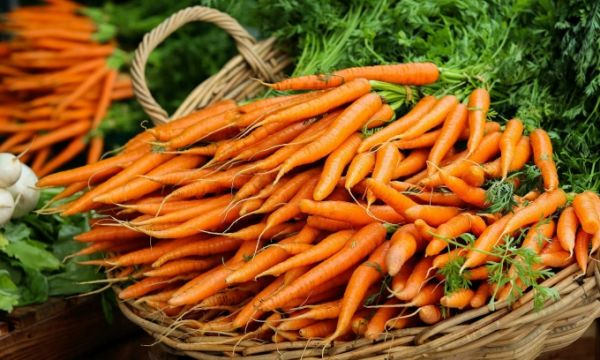
Dr. Duong Minh Phuc from the High-Tech Eye Center at Tam Anh General Hospital in Ho Chi Minh City explains that many foods rich in vitamins and antioxidants support eye health. However, consuming these in the right amounts is essential for the best results.
1. Carrots
Carrots are a great source of beta-carotene. Once ingested, this compound is converted into vitamin A, which is crucial for maintaining a healthy retina and improving vision in low-light conditions (night vision).
The beta-carotene in carrots also helps protect against macula degeneration and cataracts caused by aging, reducing blurred vision, eye fatigue, and dizziness. However, it is advised to eat carrots two to three times a week, with about 100 grams for adults and 30-50 grams for children, to avoid digestive issues or jaundice caused by excess beta-carotene not being fully absorbed.
|
Carrots on a brown wooden basket. Illustration photo by Pexels |
2. Sweet potatoes
Like carrots, sweet potatoes are packed with nutrients beneficial for eye health. Orange sweet potatoes are especially rich in beta-carotene, which helps prevent dry eyes and protects against macula degeneration.
In addition to beta-carotene, sweet potatoes contain vitamins C and E, as well as anthocyanins (more abundant in purple sweet potatoes), which help protect the retina and slow the aging process of the eyes. Purple and yellow sweet potatoes also provide lutein and zeaxanthin, which filter harmful blue light from phones, computers, and sunlight.
However, eating too much sweet potato can cause bloating and indigestion. People with diabetes should consume them in moderation due to their high starch content.
3. Beets
Beets are rich in lutein and zeaxanthin, which protect the retina from blue light and UV rays—two primary causes of macula degeneration.
Beets are also high in natural nitrates, which convert into nitric oxide in the body. This helps dilate blood vessels and improve circulation, enhancing blood flow to the eyes and supporting retinal and optic nerve function. While beets contain some beta-carotene, the amount is lower than in carrots, but still beneficial for eye health.
4. Turmeric
Dr. Phuc highlights that curcumin, the active compound in turmeric, is highly beneficial for eye health and overall well-being. Its antioxidant and anti-inflammatory properties help treat conditions like conjunctivitis, uveitis, glaucoma, diabetic retinopathy, and slow macula degeneration.
However, curcumin is poorly absorbed in the digestive tract, so it should be taken with black pepper, which contains piperine to enhance absorption. Excess turmeric should be avoided, as it can cause nausea, stomach pain, and potential liver damage.
5. Onions
While onions may not directly improve vision, they indirectly support eye health. They are rich in antioxidants, particularly quercetin, which has anti-inflammatory effects and helps reduce damage from free radicals—factors contributing to macula degeneration and cataracts due to aging.
This compound also improves blood circulation, providing oxygen and nutrients essential for the eyes, especially the retina. Onion extract may help prevent mild eye infections, but it should never be applied directly to the eyes, as it can cause irritation or burns.
Dr. Phuc recommends combining onions with foods rich in vitamin A, lutein, and zeaxanthin—such as carrots, leafy greens, salmon, and eggs—to boost eye protection.